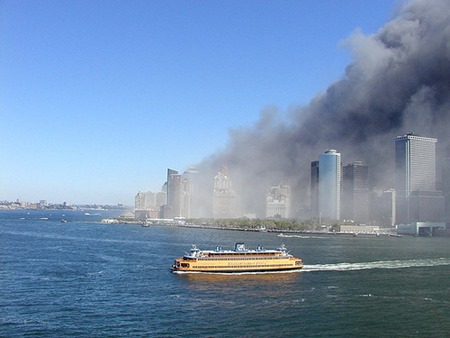
Image by 9/11 photos
“Terrorist” and “terrorism” are politically motivated words, interchangeable with “clinically insane”, “religious extremists” or “(ideology)-ists”. The Northern Irish Loyalists are causing bomb alerts, and acting in violent manners, and have for many decades, in order to fight against any attempt any change to their nation. Yet, they are called “paramilitaries”, when their aim can, sometimes, to create mass destruction and terror, the very characteristics that make a definition of a terrorist. By definition, Guy Fawkes was a terrorist. By definition, Breivik was a terrorist. By definition, any of those high school and university massacrists in the United States are terrorists. Note, however, how the media changes their portrayal of these people.
Breivik, a far-right Christian, initiated his attacks against the Norweigan Labour Party in order to bring attention to his views of islamophobia, Zionism, anti-feminism, anti-multiculturalism and apartheid. He killed 77 people via bombs and shootings to further his political causes. He stood in court and pleaded guilty. He committed acts of terrorism and whilst the media may use the word terrorism, it appears sly and almost invisible amongst the other adjectives on the page; the media called him a “mass killer” with an “extremist ideology” who committed “acts of political violence” (reported the BBC), while the Telegraph called him a Christian fundamentalist with certain “political traits”. The latter had no mention of “terrorism”.
Meanwhile, the shootings at a Batman screening in the United States earlier this year were carried out by a “former neuroscience student” turned “gunman”, reported the BBC. Don’t the media make him sound a much more innocent person than he was? In fact, some media reports made it sound as if we should pity him – after all, he was probably suffering from some form of mental illness and we shouldn’t take it personally.
In contrast, no member of society would argue that Al-Qaeda are not terrorists. So what makes them different? It seems improbable that we could name anyone of a western nation as a terrorist; after all, their underlying ideals are right – perhaps they have the right religion – they have simply gone insane. Maybe they didn’t receive enough support from their country. Poor them. They were driven to this by, most likely, a chain of distressing events in their life.
Al-Qaeda – how dare they? Those religious extremists will stop at nothing to destroy our civilised western nations. Somebody needs to teach them a lesson – perhaps we should send in our armies for 10 years – maybe longer? That should sort it. We’ll teach them what a good nation looks like. Say hello to democracy via an authoritarian and coercive means – that’s what democracy is all about. The west is best.
Something is wrong here. Language is overly important, and really shapes how we think. The more the media and our leaders associate one word with one image, the more we are to reject any alternative, yet true, images. As Wittgenstein said, “the limits of my language mean the limits of my world” after all.

